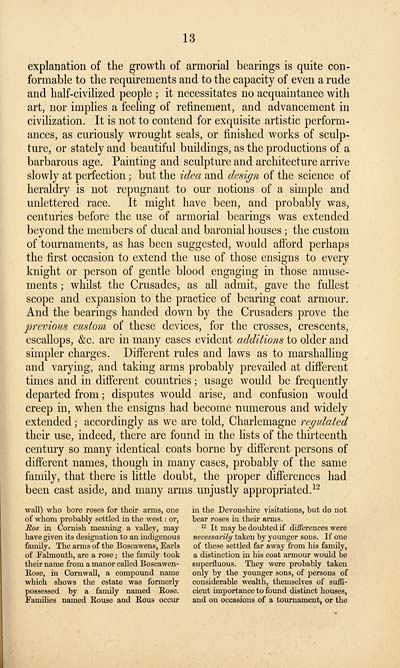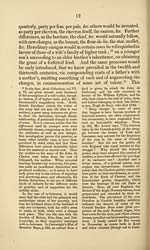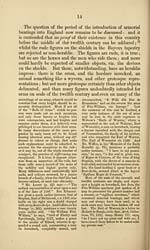Notices of the Ellises of England, Scotland, and Ireland, from the conquest to the present time
(353) Page 349
Download files
Complete book:
Individual page:
Thumbnail gallery: Grid view | List view

13
explanation of the growth of armorial bearings is quite con-
formable to the requirements and to the capacity of even a rude
and half-civilized people ; it necessitates no acquaintance with
art, nor implies a feeling of refinement, and advancement in
civilization. It is not to contend for exquisite artistic perform-
ances, as curiously wrought seals, or finished works of sculp-
ture, or stately and beautiful buildings, as the productions of a
barbarous age. Painting and sculpture and architecture arrive
slowly at perfection ; but the idea and design of the science of
heraldry is not repugnant to our notions of a simple and
unlettered race. It might have been, and probably was,
centuries before the use of armorial bearings was extended
beyond the members of ducal and baronial houses ; the custom
of tournaments, as has been suggested, would afford perhaps
the first occasion to extend the use of those ensigns to every
knight or person of gentle blood engaging in those amuse-
ments ; whilst the Crusades, as all admit, gave the fullest
scope and expansion to the practice of bearing coat armour.
And the bearings handed down by the Crusaders prove the
previous custom of these devices, for the crosses, crescents,
escallops, &c. are in many cases evident additions to older and
simpler charges. Different rules and laws as to marshalling
and varying, and taking arms probably prevailed at different
times and in different countries ; usage would be frequently
departed from ; disputes would arise, and confusion would
creep in, when the ensigns had become numerous and widely
extended ; accordingly as we are told, Charlemagne regulated
their use, indeed, there are found in the lists of the thirteenth
century so many identical coats borne by different persons of
different names, though in many cases, probably of the same
family, that there is little doubt, the proper differences had
been cast aside, and many arms unjustly appropriated. 12
wall) who bore roses for their arms, one in the Devonshire visitations, but do not
of whom probably settled in the west : or, bear roses in their arms.
Ros in Cornish meaning a valley, may n It may be doubted if differences were
have given its designation to an indigenous necessarily taken by younger sons. If one
family. The arms of the Boseawens, Earls of these settled far away from his family,
of Falmouth, are a rose ; the family took a distinction in his coat armour would be
their name from a manor called Boscawen- superfluous. They were probably taken
Hose, in Cornwall, a compound name only by the younger sons, of persons of
which shows the estate was formerly considerable wealth, themselves of suffi-
possessed by a family named Eose. cient importance to found distinct houses,
Families named Rouse and Rous occur and on occasions of a tournament, or the
explanation of the growth of armorial bearings is quite con-
formable to the requirements and to the capacity of even a rude
and half-civilized people ; it necessitates no acquaintance with
art, nor implies a feeling of refinement, and advancement in
civilization. It is not to contend for exquisite artistic perform-
ances, as curiously wrought seals, or finished works of sculp-
ture, or stately and beautiful buildings, as the productions of a
barbarous age. Painting and sculpture and architecture arrive
slowly at perfection ; but the idea and design of the science of
heraldry is not repugnant to our notions of a simple and
unlettered race. It might have been, and probably was,
centuries before the use of armorial bearings was extended
beyond the members of ducal and baronial houses ; the custom
of tournaments, as has been suggested, would afford perhaps
the first occasion to extend the use of those ensigns to every
knight or person of gentle blood engaging in those amuse-
ments ; whilst the Crusades, as all admit, gave the fullest
scope and expansion to the practice of bearing coat armour.
And the bearings handed down by the Crusaders prove the
previous custom of these devices, for the crosses, crescents,
escallops, &c. are in many cases evident additions to older and
simpler charges. Different rules and laws as to marshalling
and varying, and taking arms probably prevailed at different
times and in different countries ; usage would be frequently
departed from ; disputes would arise, and confusion would
creep in, when the ensigns had become numerous and widely
extended ; accordingly as we are told, Charlemagne regulated
their use, indeed, there are found in the lists of the thirteenth
century so many identical coats borne by different persons of
different names, though in many cases, probably of the same
family, that there is little doubt, the proper differences had
been cast aside, and many arms unjustly appropriated. 12
wall) who bore roses for their arms, one in the Devonshire visitations, but do not
of whom probably settled in the west : or, bear roses in their arms.
Ros in Cornish meaning a valley, may n It may be doubted if differences were
have given its designation to an indigenous necessarily taken by younger sons. If one
family. The arms of the Boseawens, Earls of these settled far away from his family,
of Falmouth, are a rose ; the family took a distinction in his coat armour would be
their name from a manor called Boscawen- superfluous. They were probably taken
Hose, in Cornwall, a compound name only by the younger sons, of persons of
which shows the estate was formerly considerable wealth, themselves of suffi-
possessed by a family named Eose. cient importance to found distinct houses,
Families named Rouse and Rous occur and on occasions of a tournament, or the
Set display mode to:
![]() Universal Viewer |
Universal Viewer | ![]() Mirador |
Large image | Transcription
Mirador |
Large image | Transcription
Images and transcriptions on this page, including medium image downloads, may be used under the Creative Commons Attribution 4.0 International Licence unless otherwise stated. ![]()
| Histories of Scottish families > Notices of the Ellises of England, Scotland, and Ireland, from the conquest to the present time > (353) Page 349 |
|---|
| Permanent URL | https://digital.nls.uk/95549849 |
|---|
| Description | A selection of almost 400 printed items relating to the history of Scottish families, mostly dating from the 19th and early 20th centuries. Includes memoirs, genealogies and clan histories, with a few produced by emigrant families. The earliest family history goes back to AD 916. |
|---|

